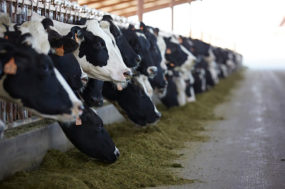But what do we do when we suspect a team member on our dairy is under the influence of drugs or alcohol at work? What do we do when there is a suspicion of impairment, and how do we manage this scenario?
When we talk about impairment in the workplace, what are we talking about?
Impairment at work simply means someone is under the influence of a “mind-altering” substance. This can include alcohol, marijuana (recreational or medicinal), illicit drugs, narcotics but also can include prescription medications and over-the-counter medications.
Any of these substances have the potential to affect the judgment, mental state, decision-making abilities, cognitive function and more of our team members.
The reason this issue is so important is for their safety and the safety of those around them as well as the care they are giving to the animals. An impaired team member on the dairy could seriously injure themselves or another team member.
Think of a drunk driver – now think of them driving tractors through your barn or yard. This is something we must plan for with policies, train team members on and understand how to handle so it can be dealt with immediately in order to eliminate threats to safety as soon as possible.
Your policy on substance control
Alcohol is a legal substance for those of age – but does that mean people can drink at work? Of course not. The same goes for marijuana. It is legal in Ontario if you are of age; however, it is not permitted for team members to be under the influence of marijuana at work.
The matter gets even trickier when we begin to talk about things like prescription and over-the-counter medications. This is where a policy is pivotal on your dairy. A policy on substance control, well thought out and laid out well in advance, will give you guidance and clarity in a situation where you are upset, frustrated and confused on what to do.
This policy should outline the organization’s stance on all mind-altering substances. Each dairy’s policy will be a little different and should reflect the mission, vision and values on your operation.
Below are some best practice starting points for a substance control policy on your dairy:
-
Scope: It should be stated who the policy applies to, which should include yourself as an employer, employees, supervisors, customers, contractors and visitors coming onto your dairy.
-
Expectations: It needs to be clearly laid out that team members are prohibited from working under the influence of any substance and that team members must arrive for work fit for duty and stay that way the entirety of their shift. It also can explain what team members might expect if they are caught under the influence at work, up to and including termination of employment with cause.
-
Alcohol and recreational marijuana: State these are prohibited substances on your dairy.
-
Prescription and over-the-counter medications: Make it clear these substances have the possibility to be mind-altering, such as pain management medications after a surgery or over-the-counter pain killers, and that team members should report to management if they are taking a medication that can be mind-altering, not for disciplinary reasons but so a plan can be devised for a suitable return-to-work date or safer work responsibility in the meantime.
- Illicit drugs: Establish these substances are prohibited from the workplace.
A comprehensive policy should also include a plan to accommodate, to the point of undue hardship, any dependency-related concerns or prescribed medication needs (which are mind-altering).
Drug and prescription medication abuse in some situations can fall under a protected ground in the Ontario Human Rights Code. In any case where there are dependency-related concerns or substance abuse concerns with a member of your team, it is recommended you seek assistance from a human resources, health and safety professional or legal counsel.
They will be able to help you devise a suitable plan for getting your team member the help they may need and get them back to work in a manner safe for both themselves and the rest of your team.
Suspicion of impairment at work
When you suspect impairment at work, there are some steps you can take to ensure you are protecting everyone on your dairy and the team member in question.
1. If you noticed something, such as the odour of alcohol, slurred speech, stumbling, etc., document what you have witnessed. This will help you immensely in the future if you are questioned on why you had reasonable suspicion.
2. Sit down with the person in question and tell them you have concerns for the above reason and ask if they have an explanation for the behaviour witnessed.
Remember: A lot of this is your judgment; there is no sure-fire way of knowing in the moment on your part as an employer. Have the conversation.
3. If you are sure they are under the influence and do not want to tell you, it is your judgment if they are a threat to themselves or others at work.
If you think they may injure themselves or others, they must leave work. Do not let them drive themselves home. If possible, have them take a taxi home or have a member of management drive them home.
4. When they come in for the next shift, they must discuss with you the events of the prior shift and, again, it will be your judgment as to how you would like to move forward.
Each case of impairment is different, and this may be where you want to ask a professional for assistance.
5. You may choose to implement a corrective action, such as a suspension without pay, written warning, etc.
Termination of employment should only be done if you have proper documentation and proper steps have been followed leading to the termination.
This is a step which should be taken with advice from a human resources, health and safety professional or advice from legal counsel.
At the end of the day, safety is our goal, and being able to manage impairment in the workplace is a major action we can take to ensure our team’s safety.
Ultimately, we want to make sure mind-altering substances do not pose threats to our team’s health and safety. It is not always easy to know if someone is under the influence, and it can be difficult to deal with.
Having a policy everyone is aware of is a great place to start. And as always, don’t hesitate to reach out to a human resources, health and safety professional for assistance. ![]()

-
Danielle Pasztor
- Farm Safety Specialist and HR Consultant
- PeopleManagement Group Inc.
- Email Danielle Pasztor








